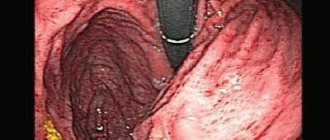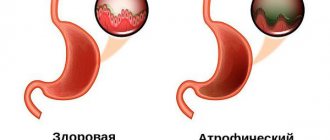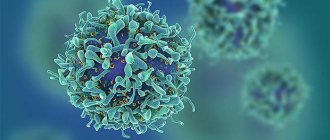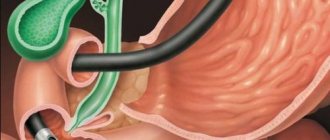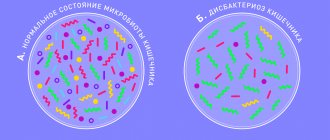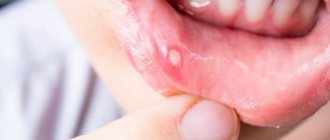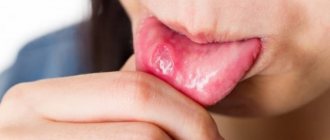Erythematous gastritis is a form of chronic inflammation of the stomach. It develops gradually and has its own characteristic features. To understand what erythematous gastritis is, you should decipher the concept of erythema . Literally translated from Greek, the term ἐρυθρός means red. In medicine, erythema is the redness of the skin or mucous membranes caused by vasodilation.
In relation to gastritis, the term is used when, during an endoscopic examination of the stomach, the doctor sees diffuse or limited hyperemic areas on the gastric mucosa. In some cases, pinpoint hemorrhages or small erosions are found in the area of erythematous inflammation. Such pathological inclusions can ooze, releasing colorless or pinkish ichor, then we are talking about erythematous exudative gastritis.
Causes and main symptoms of erythematous gastritis
Normally, the inside of the stomach is covered with a thin pink membrane.
The mucous membrane protects the organ from the effects of acid produced by the digestive glands, as well as from the components of the bolus of food entering the stomach.
When exposed to certain factors, the mucous membrane loses its integrity and resistance to irritants. The process of inflammation begins in it and a disease such as gastritis develops.
Erythematous gastritis comes in several forms, which differ in the severity of symptoms
The concept of gastritis
Gastritis comes in different types and forms. According to the nature of their course, they can be acute or chronic. One of the varieties of a protracted process is considered to be erythematous gastritis.
Erythematous gastritis is a disease of the epithelial lining of the stomach with small, most often bright red rashes in the form of ulcers. As a rule, damage occurs in the lower part of the organ, which, in addition to its motor role, performs the function of reducing acidity during the passage of food chyme into the duodenum.
With this type of gastritis, inflammatory changes are superficial, but despite this, the disease can quickly develop into another form of the disease and cause serious complications.
Erythematous gastritis quickly develops into more dangerous forms
Forms of erythematous gastritis
- Superficial - with this form, changes are observed only in the upper layer of the mucosa. Superficial gastritis is the initial process of inflammation of the stomach and, with proper and timely therapy, can be cured without entering the chronic stage.
- The focal form is characterized by multiple point changes in the mucosa. The main complaint of patients diagnosed with focal gastritis is local, aching pain in the abdominal cavity. When foci of inflammation appear in the antrum, gastric ulcers may develop.
- Exudative or eosinophilic form of gastritis. At the site of mucosal damage, an accumulation of eosinophils occurs. The cause of the disease is helminthic infestations. Erythematous exudative gastritis is most often observed in people prone to allergic reactions.
The exudative form of gastritis is provoked by helminthic infestation
What causes the development of gastritis
The gastric mucosa is subject to various influences of irritating factors, which, with a weak immune system, gradually lead to its destruction. There are some reasons that can cause stomach diseases:
- regular use of medications that have a severe effect on the mucous membrane;
- consumption of alcohol and various products containing components that negatively affect the stomach;
- eating disorder;
- bacteria - causative agents of infections, most often the Helicobacter pylori bacillus;
- hereditary predisposition;
- frequent consumption of hot or cold foods;
- stress and physical strain;
- malfunction of the digestive glands.
Hot food can cause stomach inflammation
Complaints with gastritis
The signs of all gastritis at the initial stage are almost the same. Patients begin to complain most often when the disease becomes more complicated.
During the initial stages of inflammation, as a rule, the symptoms are barely noticeable, which does not raise any particular suspicion about the onset of the disease.
When gastritis becomes more serious, the following symptoms are observed:
- loss of appetite;
- nausea in the morning or after eating;
- periodic vomiting;
- violation of bowel regularity;
- pain in the stomach on an empty stomach and a feeling of heaviness after eating;
- belching, heartburn;
- bloating;
- weight loss.
Gastritis is characterized by lack of appetite
With regular disruption of the digestive process, an imbalance occurs in the functioning of other organs.
The functioning of the intestines is upset, the liver and pancreas are gradually involved in the process, and anemia develops as a result of impaired absorption of enzymes and microelements.
A person begins to feel a loss of strength, a decrease in mood, and surges in blood pressure. When a patient consults a doctor, complaints may already be complex.
The main method of confirming the diagnosis is gastric endoscopy, where you can see local changes in the mucosa and determine the extent and depth of damage to the membrane. It is also necessary to conduct an ultrasound and determine the acidity of gastric juice.
How to treat incipient erythematous gastritis
Any treatment for the stomach begins with the correct selection of diet. In the acute stage of the disease, spices, fried, fatty, and baked foods must be excluded from the diet. Food should be light and simple in texture. Method of preparation: steamed or boiled only. Before eating, you need to grind the food with a blender or grater.
For erythematous gastritis, all dishes should be chopped before consumption
The diet should contain a sufficient amount of protein and easily digestible fiber. Breakfast should start with enveloping porridges and jelly. After the acute period has passed, you can add stewed vegetables or casseroles, light salads, omelettes, and a little salt and sugar for spices. It will be useful to drink fermented milk drinks, especially 2-3 hours before bedtime.
Taking medications is a necessary condition for restoring the gastric mucosa. Treatment should begin with eliminating the cause of gastritis. The doctor may prescribe antibacterial drugs if gastritis is caused by Helicobacter bacillus - Trichopolum, Amoxicillin. Stomach-coating drugs - Vikalin, De-nol - must be prescribed.
Based on the results of determining the acidity of gastric juice, agents are selected that increase or decrease the production of hydrochloric acid. Enzymes that help proper digestion, antispasmodics, painkillers, antiemetics, sedatives are also prescribed depending on the severity of the disease.
Drugs for the treatment of erythematous gastritis are selected depending on the symptoms
Along with medications, it is advisable to use traditional medicine methods:
- in pharmacies you can purchase a gastric mixture with a complex of herbs that have a positive effect on the condition of the mucous membrane;
- Taking Kyzyl May oil on an empty stomach has a good effect; it has a wound-healing effect, softens the lining of the stomach, relieves inflammation and pain;
- a decoction of flax seeds also creates a protective film in the stomach, relieves swelling and inflammation;
- White cabbage juice or freshly squeezed potato juice help with stomach diseases.
But even traditional medicine can have a negative effect on the body if the treatment prescription is chosen incorrectly. Before starting to take herbs or juice, you should consult your doctor.
Treatment is selected only by a gastroenterologist, taking into account the diagnosis, complaints and individual characteristics of the person. Your health depends only on how quickly you seek qualified help.
What symptoms appear with gastritis, you will learn from the video:
Nutrition when sick
Treatment will be ineffective if the patient does not follow a diet for erythematous gastritis, and this requires complete exclusion of irritating foods from the diet:
- coffee, carbonated drinks, cocoa and chocolate, any alcohol;
- canned food, marinades, store-bought sauces, pickles;
- semi-finished products, fast food;
- whole milk, sour cream;
- baked goods, sweets, yeast baked goods, brown bread;
- smoked, fatty foods.
The doctor will give an extended list of nutritional recommendations for exudative gastritis.
Treatment of erythematous gastritis
Diseases of the gastrointestinal tract are very common in our time of stress and accelerated pace of life. Poor nutrition and bad habits provoke the development of diseases in people of all ages.
Gastritis today is not a curiosity; it can affect anyone who neglects their health in pursuit of other values.
To avoid a chronic condition or more serious consequences, it is better to start treatment at the first stages of the disease.
Treatment of erythematous gastritis should begin immediately to avoid the disease becoming chronic.
The mild stage of the disease may well recede due to the transition to a healthy diet, without taking medications. But if the moment has already been missed, then more serious measures are taken to combat the disease.
Types of erythematous gastritis
Erythematous gastritis occupies a prominent place in the classification of gastritis. It occurs frequently, and several forms of the disease are known to medicine.
The symptoms of erythematous gastritis are not much different from the usual forms of gastritis, so a thorough diagnosis should be carried out to make a correct diagnosis. The website gastritinform.ru provides detailed information about erythematous gastritis.
You can find out details about its varieties, as well as approximate treatment regimens for the disease.
Erythematous gastritis: features of development and treatment of pathology
The erythematous form of gastritis is a fairly common gastrointestinal pathology in which characteristic erythematous spots form on the gastric mucosa, which over time turn into erosive formations.
The erythematous form of gastritis is a fairly common gastrointestinal pathology in which characteristic erythematous spots form on the gastric mucosa, which over time turn into erosive formations
Such spots are oval in shape and can be bright red or pink in color. This gastritis form refers to chronic inflammatory pathologies in which lesions spread only to the superficial mucous membranes. In addition, the pathology is usually localized in the antrum of the organ.
If you do not start treating the pathology in a timely manner, the erythema will begin to turn into ulcerative formations, which will bleed and only worsen the condition of the patients.
Experts identify various forms of erythematous inflammation of the stomach:
- Atrophic - when inflammation also causes atrophy of the glands;
- Diffuse - or pangastritis, in which erythematous lesions spread over the entire area of the gastric mucosa;
- Focal - when the lesion spreads to specific areas of the organ, this form later transforms into a peptic ulcer;
- Antral - when the pathology is localized in the antrum, which is the transition to the intestine;
- The exudative form is typical of atrophic and superficial inflammation, the lesion covers several mucous areas, and develops more often due to helminthic parasites.
Causes of erythematous gastritis of the stomach
Diseases of the digestive system occur due to a large number of factors, since in case of any malfunction in the body, the gastrointestinal tract suffers first. When gastritis occurs, the following reasons play an initial role:
- constant nervous tension, stressful situations, sleep disturbances;
- the use of heavy medications, often without the knowledge of the doctor;
- violation of nutritional culture, habit of eating dry food;
- damage to the body by pathogens - viruses and bacteria;
- genetic predisposition to the disease.
Sometimes several reasons are enough for the disease to make itself felt, therefore, if a person has a predisposition to gastritis, it is worth adjusting his daily routine and taking more care of his health.
Kinds
Erythematous exudative gastritis
Erythematous gastritis is one of the most common inflammatory diseases of the gastrointestinal tract, which is characterized by changes in the gastric mucosa and the appearance of red spots on it, turning into erosions. Depending on the location of the inflammation, there are several types of this disease:
Disease therapy
The exudative form does not belong to the initial stage of gastritis. It is not so easy to treat, but therapy with medications, natural recipes and diet makes life much easier for the patient and slows down tissue degradation.
Important! The main goal of treatment is to stop erosion and inflammation, relieve acute symptoms of exudative gastritis.
Drugs are used to relieve primary discomfort, as well as to eliminate the underlying causes of the disease if it is caused by microbes or fungi. For this purpose, anibiotics and probiotics are used, but this is done exclusively by the attending physician.
Another important point is taking courses of physiotherapeutic procedures: magnetic therapy, ultrasound, photophoresis. Some patients turn to traditional Chinese medicine.
Magnetotherapy
